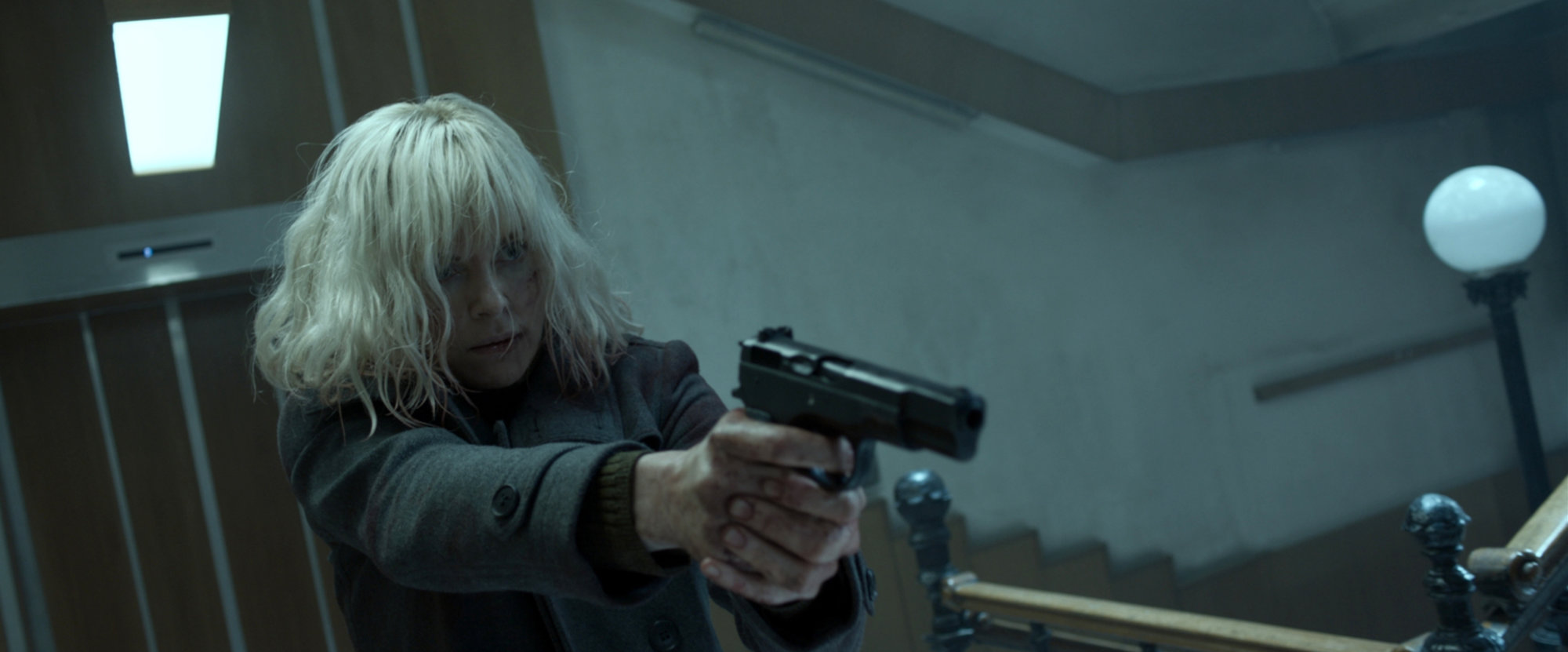 ★★★★½
★★★★½
“Truly a nuclear option.”
 Ladies and gentlemen, we have a new action queen in town. With Angelina Jolie apparently abdicating that title after Salt, the throne was vacant. Theron had already made a very solid case in Mad Max: Fury Road, then solidified it in The Huntsman: Winter’s War. But there were still doubts: could she hold the true focus of a genuinely action-driven film? There are doubts no more, for Atomic Blonde gives us Theron in the role of Lorraine Broughton, the baddest-ass heroine since The Bride in the first Kill Bill.
Ladies and gentlemen, we have a new action queen in town. With Angelina Jolie apparently abdicating that title after Salt, the throne was vacant. Theron had already made a very solid case in Mad Max: Fury Road, then solidified it in The Huntsman: Winter’s War. But there were still doubts: could she hold the true focus of a genuinely action-driven film? There are doubts no more, for Atomic Blonde gives us Theron in the role of Lorraine Broughton, the baddest-ass heroine since The Bride in the first Kill Bill.
She’s an agent of British intelligence, sent to Berlin in the very last days of the Communist regime. Her mission is to retrieve a list which details the identities of every Soviet agent in the field, provided by a Russian defector. Before she has even met her contact there, David Percival (McAvoy), chief at the Berlin station, Broughton has been made by the Russians. Turns out, they have a mole, codenamed “Satchel”, who will stop at nothing to prevent the list from making it into Western hands, thereby revealing their identity. The exhortation of one of her bosses on her way out the door in London, “Trust no-one,” proves to be entirely accurate, as she makes her way across a landscape formed largely of moral rubble from the imminently collapsing Berlin Wall.
The story unfolds in flashback, during a debriefing in London, in which a severely battered Broughton recounts the events that unfolded as she tried to track down the list – and when that proves impossible, the defector, since he claims to have memorized its contents. It’s a perpetually shifting quicksand of allegiances, not least Percival, who has been in the city so long as to have “gone native”. There’s also Delphine Lasalle (Boutella), a French agent for whom Broughton falls, though it’s never clear whether their resulting spot of canoodling is for the purposes of her mission. It’s certainly not difficult on the eye [Boutella may be an action heroine to watch in future, having impressed both as the spring-loaded Gazelle in Kingsman: The Secret Service and one of the better things about recent Tom Cruise vehicle, The Mummy].
If you’ve seen the trailer, you’ll know why this was my most anticipated film of the year, and the action is every bit as slickly brutal as you’d expect from the co-director of John Wick – Leitch wasn’t credited there because the Directors’ Guild of America don’t like dual credits. This is ferociously hard-hitting stuff, clear from the opening scene, and escalating steadily thereafter. Broughton’s credentials are equally apparent immediately, as she escapes a kidnap attempt on the way from Berlin Airport, brawling her way viciously out of a car’s back seat. Yet this is merely an appetizer for what is to come, and one sequence in particular.
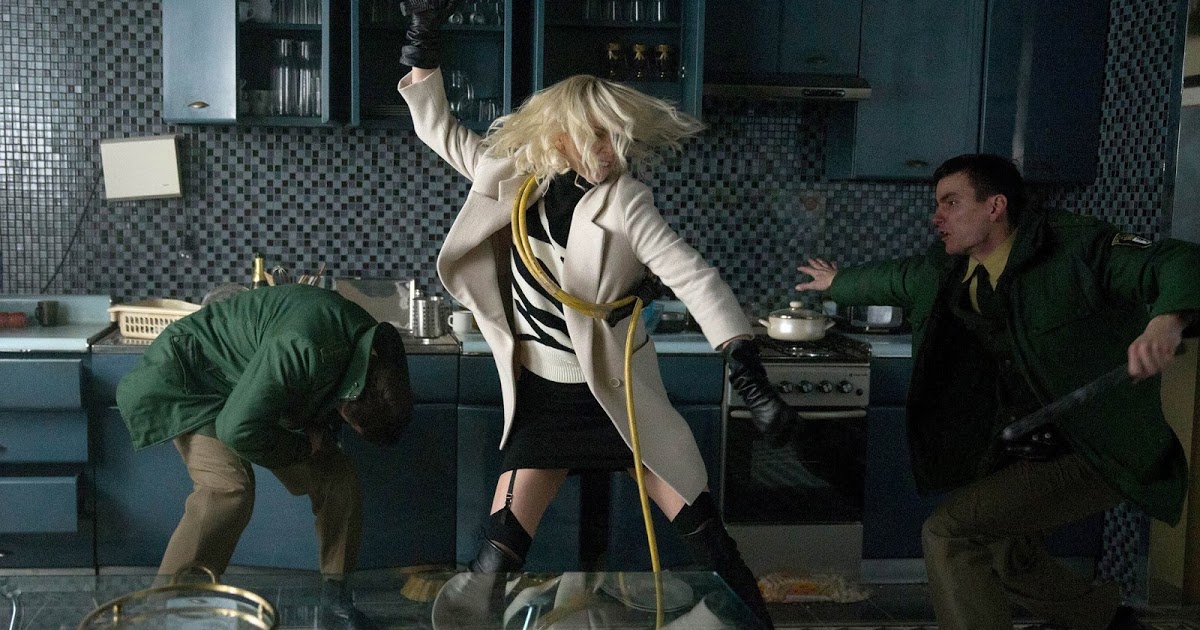
The scene in question sees Broughton escorting the defector, who has already been wounded. They take refuge in an apartment building only to be followed there by a bevy of Russian agents, whom she has to fend off with bullets, fists and even a convenient corkscrew. It’s nine minutes long, and appears to be shot in a single, unbroken take. Key word “appears” – if you look closely, you will likely be able to spot the moments where they cleverly blend the shots (about 20 or so, according to Leitch) together while the camera pans, tracks and zooms through the building. It’s still likely the most intense and hardcore battle in action heroine history, with the participants selling every blow impeccably. This is awesome, ground breaking stuff, and I haven’t enjoyed a scene so much since – again – Kill Bill, Volume 1.
For I’ve seen hard-hitting and inventively choreographed fights before. I’ve seen well-shot and technically impressive fights before. It’s the combination here which is almost unparalleled. Maybe the duel between Michelle Yeoh and Zhang Zi Yi in Crouching Tiger is the only one that comes close, though it had a very different kind of artistry, one that was based on grace and fluidity. [Outside our genre, I was additionally reminded of the car chase in Children of Men, which was apparently an inspiration] This is Lorraine Broughton, doing absolutely whatever she needs to survive, from second to second and moment to moment. It’s raw, animalistic and moves the bar for future action heroines to an entirely new level.
This is actually a problem, because it there’s still a good chunk of the film to go, and nothing the rest of the way comes close. As a result, there’s a sense of letdown from the adrenaline high, even if the final attempt of the Russians to kill Broughton is by no means bad. I’m hard pushed to find anything else of much significance to criticize here. We’ve got an Oscar-winning actress going full-on into the old ultraviolence? What’s not to love? Admittedly, the actual spy plot is a good deal less inventive and original than just about every other aspect here. But it’s merely a backdrop, the canvas on which Leitch and Theron paint their bloody masterpiece. Oh, and if you can’t get permission to use Ministry’s version of Stigmata, find something else. Do not use Marilyn Manson to cover it. He is not Al Jourgensen.
Otherwise, though, I should devote a full paragraph to the soundtrack, since it kicked ass, almost as much as Charlize. I’m a child of the eighties. It was the soundtrack to my teenage and college years, and I even spent some time in Berlin, on both side of the wall, in the middle of the decade. While that would be a couple of years before the events depicted here, it still brought back a heck of a lot of memories. Part of this might be the music, which plays like they rifled my CD collection. It starts with New Order’s Blue Monday, then segues into the opening credits which play out over David Bowie’s theme from Cat People, as Broughton stalks through the London streets. If not the first time that has been purloined for another movie – Quentin Tarantino used it, inexplicably, for World War 2 movie Inglourious Basterds – it works a lot better here. Consider me sold.
This is an action heroine in its most literal of terms. Broughton has often been compared to James Bond, yet she’s even more cool, detached and almost emotionless in some ways. It absolutely deserves a franchise, with its central character chewing her way through post-Cold War history like a shark in human form, always moving forward – and if you get in the way, it will end up the worse for you. Every step is absolutely purposeful and deliberate, a means to an end, and that end is her mission. Broughton does not fuck around, and neither does this film. Such single-minded determination can only be applauded.
Dir: David Leitch
Star: Charlize Theron, James McAvoy, Sofia Boutella, Toby Jones
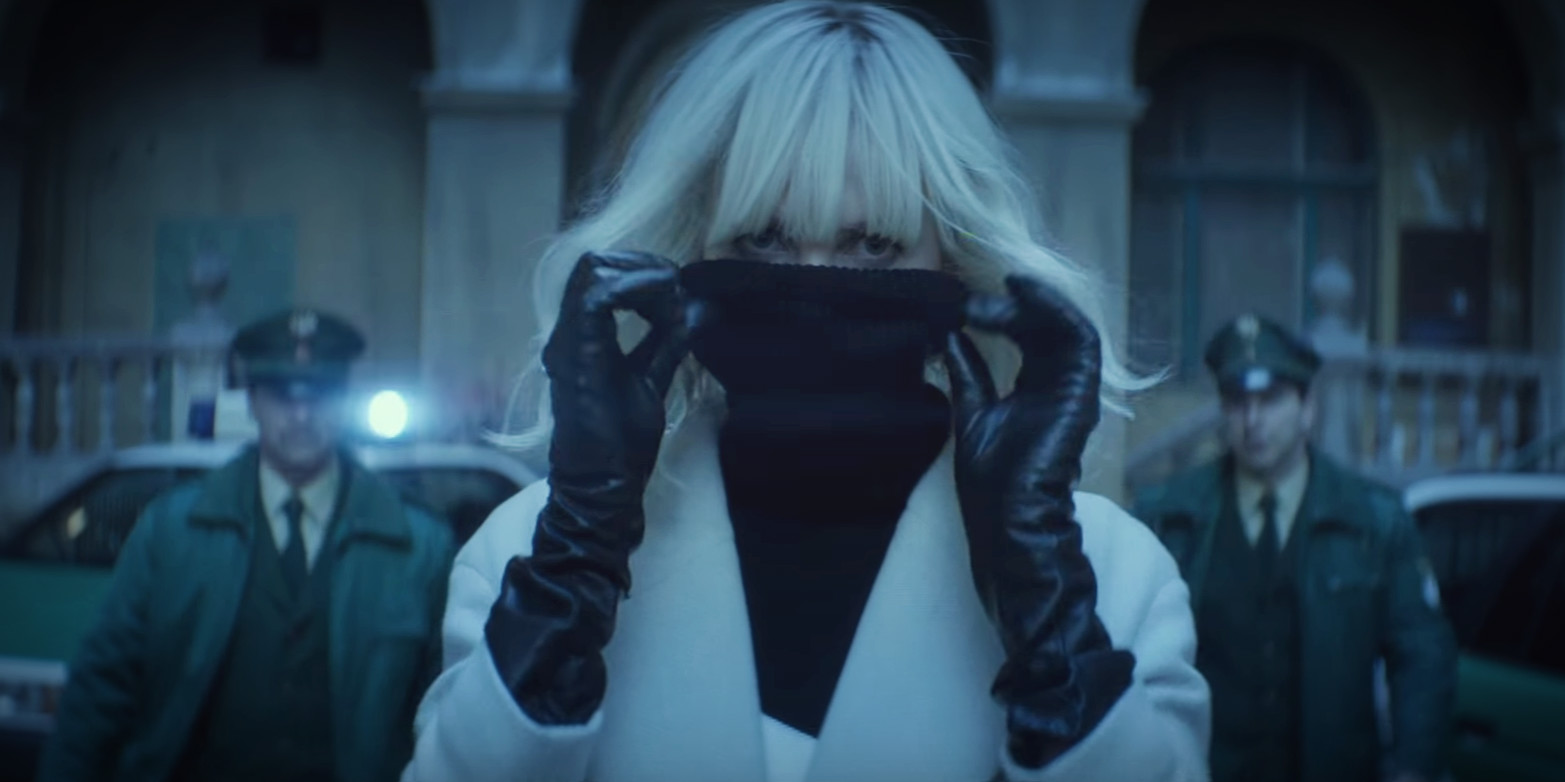
 While the lack of resources is frequently and painfully obvious, I’m inclined to look kindly on this. My tolerance is due to the abiding love for our genre possessed by writer-director Krueger, shown in the influences, both obvious and subtle, on display here. From Faster Pussycat to Female Prisoner 701, he seems like the kind of man whose DVD collection reflects my own. Hell, despite being set in America, a character here even uses the greeting stance beloved of bad girls in pinky violence movies: knees bent, right arm outstretched, palm up. I can’t truly hate a film made by someone who knows what that is.
While the lack of resources is frequently and painfully obvious, I’m inclined to look kindly on this. My tolerance is due to the abiding love for our genre possessed by writer-director Krueger, shown in the influences, both obvious and subtle, on display here. From Faster Pussycat to Female Prisoner 701, he seems like the kind of man whose DVD collection reflects my own. Hell, despite being set in America, a character here even uses the greeting stance beloved of bad girls in pinky violence movies: knees bent, right arm outstretched, palm up. I can’t truly hate a film made by someone who knows what that is.




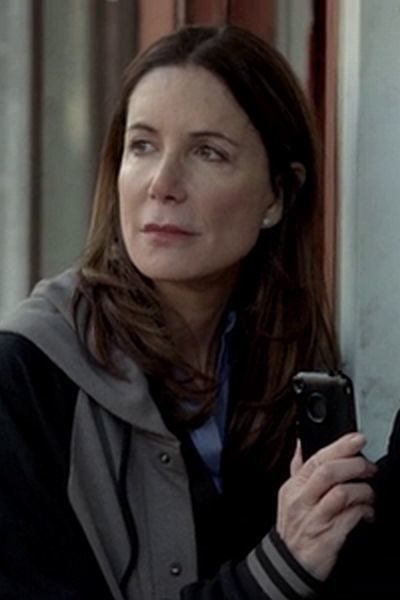 Ann Willis (Robbins) is a single mother, working as a waitress and trying to keep family together after the death of her husband from lung cancer. To help out, son David (Abrahamson) abandons his plans to attend college and gets a job in a local factory. But he falls in with some questionable company there and, lured by the prospect of easy money, starts dealing drugs for the local mobsters, run by Canarsie. Things go from bad to worse after his supposed “friend” Mike (Falahee) frames him for the disappearance of some product, and things end with David’s dead body floating in the river, having been beaten to death by his associates. The cops, and in particular, Detective Frank Hogan (Baldwin), investigate – but to be honest, aren’t particularly interested in one drug-dealer being killed.
Ann Willis (Robbins) is a single mother, working as a waitress and trying to keep family together after the death of her husband from lung cancer. To help out, son David (Abrahamson) abandons his plans to attend college and gets a job in a local factory. But he falls in with some questionable company there and, lured by the prospect of easy money, starts dealing drugs for the local mobsters, run by Canarsie. Things go from bad to worse after his supposed “friend” Mike (Falahee) frames him for the disappearance of some product, and things end with David’s dead body floating in the river, having been beaten to death by his associates. The cops, and in particular, Detective Frank Hogan (Baldwin), investigate – but to be honest, aren’t particularly interested in one drug-dealer being killed.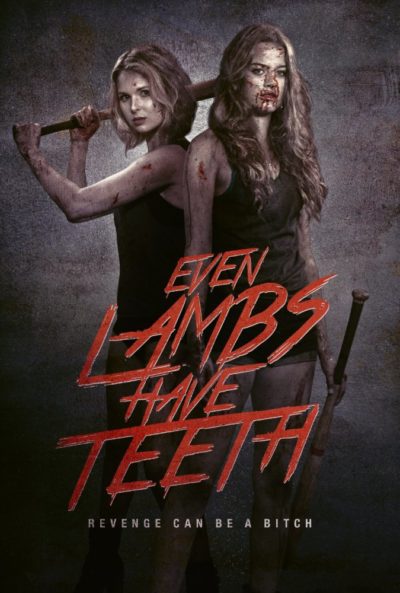 Katie (Skovbye) and Sloane (Prout) are teenage BFF’s, who head off to spend time on an organic farm – though their real goal is the weekend shopping in New York which will follow it. On the way, they are distracted by a couple of bits of prime young, rural manhood. But before you can say “roll in the hay,” they are drugged, the pair waking up to find themselves chained to duplex shipping containers, from where they are rented out as sex slaves to anyone interested. Their sudden dropping off the grid concerns Katie’s uncle Jason (Richards), who happens to be an FBI agent. He heads to the area to investigate, unaware the local sheriff is in on the plot. However, there’s only so far you can push a person, before they break. When Katie and Sloane snap, and escape, rather than heading for safety, they decide to stick around, so they can get thoroughly medieval on those responsible.
Katie (Skovbye) and Sloane (Prout) are teenage BFF’s, who head off to spend time on an organic farm – though their real goal is the weekend shopping in New York which will follow it. On the way, they are distracted by a couple of bits of prime young, rural manhood. But before you can say “roll in the hay,” they are drugged, the pair waking up to find themselves chained to duplex shipping containers, from where they are rented out as sex slaves to anyone interested. Their sudden dropping off the grid concerns Katie’s uncle Jason (Richards), who happens to be an FBI agent. He heads to the area to investigate, unaware the local sheriff is in on the plot. However, there’s only so far you can push a person, before they break. When Katie and Sloane snap, and escape, rather than heading for safety, they decide to stick around, so they can get thoroughly medieval on those responsible.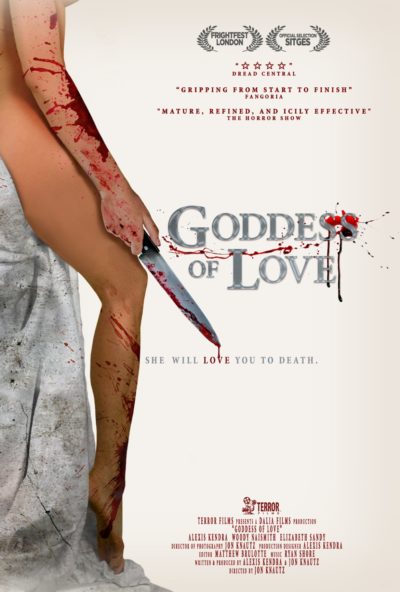 Right from the start, it’s established that Venus (Kendra) is not the most mentally stable of creatures, alternating between emotional fits in the bathtub, drug abuse and her day job as a stripper. That’s pretty much the trifecta of Stay Away for any man. But she ends up dating one of her strip-club customers, Brian (Naismith), a photographer who likes Venus because… she reminds him of his late wife. Which as opening lines go, I’d imagine would rank highly as Stay Away for any woman. While initially working far better than you’d expect, that only makes the eventual crash and burn of their relationship, all the more brutal.
Right from the start, it’s established that Venus (Kendra) is not the most mentally stable of creatures, alternating between emotional fits in the bathtub, drug abuse and her day job as a stripper. That’s pretty much the trifecta of Stay Away for any man. But she ends up dating one of her strip-club customers, Brian (Naismith), a photographer who likes Venus because… she reminds him of his late wife. Which as opening lines go, I’d imagine would rank highly as Stay Away for any woman. While initially working far better than you’d expect, that only makes the eventual crash and burn of their relationship, all the more brutal.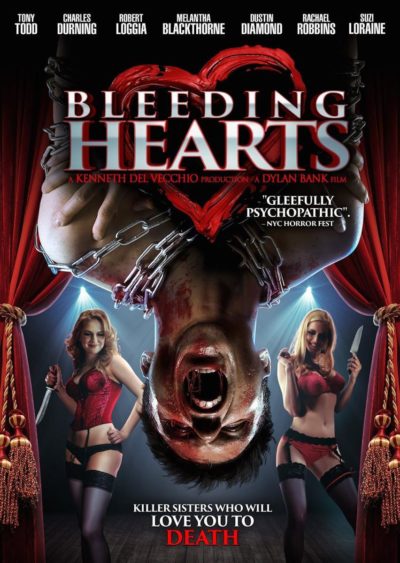 Stumbled across this low-budget horror flick almost by accident when I was Googling the similarly-titled but very different,
Stumbled across this low-budget horror flick almost by accident when I was Googling the similarly-titled but very different,  ★★★★½
★★★★½ Ladies and gentlemen, we have a new action queen in town. With Angelina Jolie apparently abdicating that title after Salt, the throne was vacant. Theron had already made a very solid case in Mad Max: Fury Road, then solidified it in The Huntsman: Winter’s War. But there were still doubts: could she hold the true focus of a genuinely action-driven film? There are doubts no more, for Atomic Blonde gives us Theron in the role of Lorraine Broughton, the baddest-ass heroine since The Bride in the first Kill Bill.
Ladies and gentlemen, we have a new action queen in town. With Angelina Jolie apparently abdicating that title after Salt, the throne was vacant. Theron had already made a very solid case in Mad Max: Fury Road, then solidified it in The Huntsman: Winter’s War. But there were still doubts: could she hold the true focus of a genuinely action-driven film? There are doubts no more, for Atomic Blonde gives us Theron in the role of Lorraine Broughton, the baddest-ass heroine since The Bride in the first Kill Bill.

 Yoga instructor May (Biel) is delighted when she finally tracks down her long-lost biological sister, Shiva (Mamet) whom she has never met. However, the reunion is soured because May discovers the abusive relationship in which Shiva is embroiled. Worse is to come, as she finds out that Shiva is actually a hooker, and her significant other, Cody (Anderson), is more pimp than boyfriend. May’s efforts to help her sibling run into stormy water – not just from Cody, but also her own boyfriend, Dex (Gathegi) and adopted mother, who think Shiva and Cody are just shaking May down. Eventually, the point comes where May has to come out of this middle-class comfort-zone, because the downward dog position isn’t going to help her and Shiva escape their increasingly perilous situation.
Yoga instructor May (Biel) is delighted when she finally tracks down her long-lost biological sister, Shiva (Mamet) whom she has never met. However, the reunion is soured because May discovers the abusive relationship in which Shiva is embroiled. Worse is to come, as she finds out that Shiva is actually a hooker, and her significant other, Cody (Anderson), is more pimp than boyfriend. May’s efforts to help her sibling run into stormy water – not just from Cody, but also her own boyfriend, Dex (Gathegi) and adopted mother, who think Shiva and Cody are just shaking May down. Eventually, the point comes where May has to come out of this middle-class comfort-zone, because the downward dog position isn’t going to help her and Shiva escape their increasingly perilous situation. ★★★★
★★★★ This is a great deal of fun, striking a very impressive balance between the drama, comedy and – to my surprise – the wrestling elements. For the show does a particularly good job of explaining both the appeal of the sports entertainment in question, and the work that goes in to making it look good. Here, it probably helps that real wrestlers were involved: Chavo Guerrero was the main consultant, and his uncle, Mando Guerrero, helped train the original GLOW ladies in the eighties. Fans will also spot John Morrison/Johnny Mundo, Brodus Clay, Carlito and Joey Ryan in various roles. It’s not at all a parody of the sport; to a significant degree, the original GLOW felt like that. But it also does extremely well at linking the wrestlers and the characters they play, and showing how the latter evolve and develop out of the former.
This is a great deal of fun, striking a very impressive balance between the drama, comedy and – to my surprise – the wrestling elements. For the show does a particularly good job of explaining both the appeal of the sports entertainment in question, and the work that goes in to making it look good. Here, it probably helps that real wrestlers were involved: Chavo Guerrero was the main consultant, and his uncle, Mando Guerrero, helped train the original GLOW ladies in the eighties. Fans will also spot John Morrison/Johnny Mundo, Brodus Clay, Carlito and Joey Ryan in various roles. It’s not at all a parody of the sport; to a significant degree, the original GLOW felt like that. But it also does extremely well at linking the wrestlers and the characters they play, and showing how the latter evolve and develop out of the former.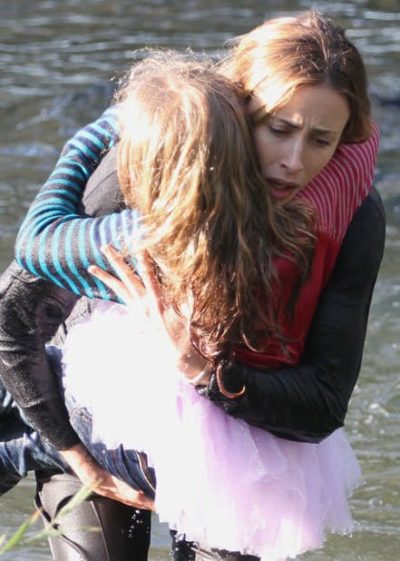
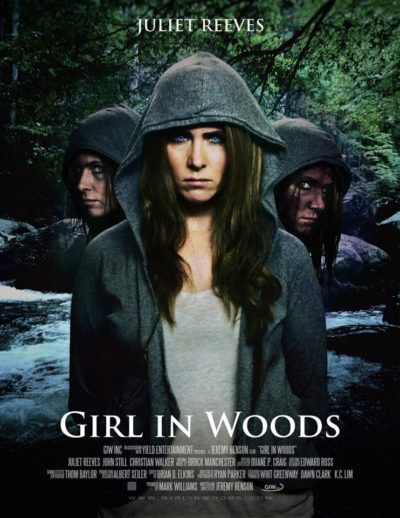 It’s always interesting when reviews of a film are deeply polarized, and that’s the case here. The first page of Google results run the gamut from “I simply despised the film as a whole” to “The images are frightening within, and the only thing better than the scares are the performances.” While I lean toward the latter, I can see how this could have failed to make a connection with some viewers, and if that happens, then there isn’t much else to prevent the former opinion. It’s the kind of film where there isn’t likey to be a middle ground in reactions.
It’s always interesting when reviews of a film are deeply polarized, and that’s the case here. The first page of Google results run the gamut from “I simply despised the film as a whole” to “The images are frightening within, and the only thing better than the scares are the performances.” While I lean toward the latter, I can see how this could have failed to make a connection with some viewers, and if that happens, then there isn’t much else to prevent the former opinion. It’s the kind of film where there isn’t likey to be a middle ground in reactions.